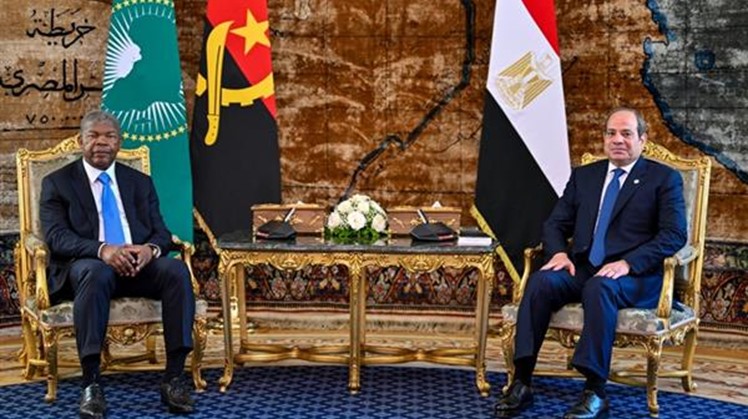CAIRO – 30 April 2025: Egyptian President Abdel Fattah El-Sisi and his Angolan counterpart João Manuel Gonçalves Lourenço emphasized the strategic partnership between their counties and agreed to boost economic cooperation during the latter’s official visit to Egypt.
A Joint statement was released on Tuesday following the three-day visit -which took place from April 28 to 30, 2025- highlighting the historical bonds of brotherhood and solidarity between Egypt and Angola, and the mutual cooperation between the countries which is rooted in Angola's struggle for independence.
During the visit, El-Sisi and Lourenço held extensive discussions on ways to enhance cooperation in various fields to serve their common interests and establish new frameworks for strategic partnership.
Both presidents emphasized the necessity of deepening economic cooperation and agreed to intensify joint efforts to promote investment and trade, particularly in sectors that contribute to economic diversification in both countries.
Moreover, the two sides reaffirmed the importance of continuing dialogue between their countries and agreed to hold the next round of political consultations in Luanda before the end of the current year.
As current members of the African Union Peace and Security Council, the two presidents exchanged views on pressing issues related to peace and security on the African continent, with a focus on the political and security situations in Congo, South Sudan, and Somalia.
Lourenço affirmed Angola's firm commitment, under its current presidency of the African Union, to supporting sustainable development, peace, and stability through the implementation of the AU's Agenda 2063 "The Africa We Want" and the "Silencing the Guns" initiative.
Regarding the situation in Sudan, the two leaders expressed their deep concern over the ongoing conflict and its humanitarian consequences, calling for an immediate cessation of hostilities and the resumption of a comprehensive national dialogue that preserves Sudan's unity and sovereignty and alleviates the suffering of its people.
They also expressed their support for regional and international initiatives aimed at reaching a peaceful solution to the crisis, emphasizing the important role of the African Union in conflict resolution and mediation efforts. They further expressed their rejection of any attempts to form a parallel government in Sudan.
On South Sudan, the two presidents expressed their concern about recent developments that could exacerbate political and security tensions. They stressed the necessity of dialogue and consensus-building, and the continued implementation of the Revitalized Agreement on the Resolution of the Conflict in the Republic of South Sudan (R-ARCSS).
Concerning Somalia, the two presidents reiterated their support for Somalia's unity, stability, and security, and condemned the escalation of terrorist activities, including the recent heinous assassination attempt targeting the Somali president.
Regarding the situation in the eastern of Congo, the two presidents reiterated their condemnation of all acts of violence that undermine peace and stability. President El-Sisi commended President Lourenço's efforts to address the crisis within the framework of the Luanda process.
The two leaders affirmed their unwavering commitment to the unity, sovereignty, and territorial integrity of Congo, and stressed the importance of continuing dialogue among all concerned parties to reach a peaceful settlement of the crisis.
The two sides also welcomed the appointment of President Faure Essozimna Gnassingbé, President of the Togolese Republic, as the new mediator in the peace process, and affirmed the fundamental role of the African Union in supporting regional initiatives to promote peace and security.
The two presidents discussed the issue of water security and cooperation across international rivers, particularly in light of water scarcity, and emphasized the necessity of managing transboundary water resources in accordance with international law in a comprehensive manner that achieves mutual benefits, while respecting the principle of "no harm." The two presidents stressed the need to refrain from unilateral actions that provoke disputes between riparian states.
At the conclusion of the visit, the two sides reaffirmed their commitment to strengthening multilateral action and stressed the urgent need to reform international institutions, foremost among them the United Nations and the Security Council, to ensure they are more inclusive, representative, and democratic, thereby enabling broader participation of developing countries in the global decision-making process.
 Wed, Apr. 30, 2025
Wed, Apr. 30, 2025